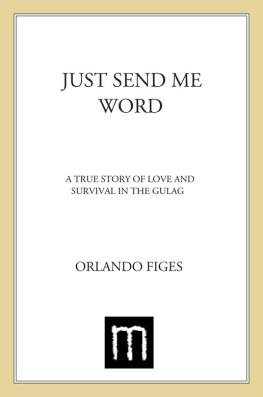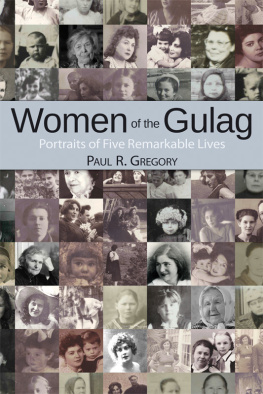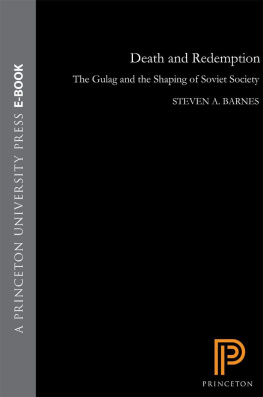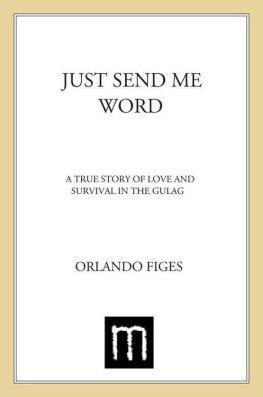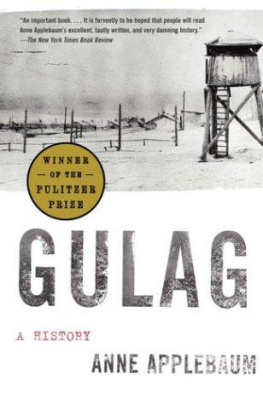Published by
The University of Alberta Press
Ring House 2
Edmonton, Alberta, Canada T6G 2E1
www.uap.ualberta.ca
Copyright 2016 Karin and Rex Marshall
LIBRARY AND ARCHIVES CANADA CATALOGUING IN PUBLICATION
Johansen, Ilse, 19161995, author
Surviving the gulag : a German womans memoir / Ilse Johansen ; Heather Marshall, editor ; Hans Rudolf Gahler, translator.
Includes index.
Translated from the German.
Issued in print and electronic formats.
ISBN 9781772120387 (paperback). ISBN 9781772122909 (EPUB). ISBN 9781772122916 (kindle). ISBN 9781772122923 (PDF)
1. Johansen, Ilse, 19161995. 2. Women political prisonersSoviet UnionBiography. 3. Women prisonersSoviet UnionBiography. 4. GermansSoviet UnionBiography. 5. Political persecutionSoviet Union. 6. Concentration campsSoviet Union. 7. Forced laborSoviet Union. I. Marshall, Heather, 1956, editor II. Gahler, Hans Rudolf, 1928, translator III. Title.
| DK268.J64A3 2016 | 365.45092 | C20169047229 |
| C20169047237 |
First edition, rst printing, 2016.
First electronic edition, 2016.
Digital conversion by Transforma Pvt. Ltd.
Copyediting and proofreading by Maya Fowler-Sutherland.
Map by Wendy Johnson.
Scanning by Dave Vasicek.
Indexing by Judy Dunlop.
Cover design by Alan Brownoff.
All rights reserved. No part of this publication may be reproduced, stored in a retrieval system, or transmitted in any form or by any means (electronic, mechanical, photocopying, recording, or otherwise) without prior written consent. Contact the University of Alberta Press for further details.
The University of Alberta Press supports copyright. Copyright fuels creativity, encourages diverse voices, promotes free speech, and creates a vibrant culture. Thank you for buying an authorized edition of this book and for complying with the copyright laws by not reproducing, scanning, or distributing any part of it in any form without permission. You are supporting writers and allowing University of Alberta Press to continue to publish books for every reader.
The University of Alberta Press gratefully acknowledges the support received for its publishing program from the Government of Canada, the Canada Council for the Arts, and the Government of Alberta through the Alberta Media Fund.

We dedicate this book to all those who have endured the Russian labour camps and especially those who survived. We also remember the many, from a worldwide perspective, who have endured, and are enduring, the atrocities of an oppressive government. To those who, today, press our world leaders to never let those in power oppress their populations.
Contents
HANS RUDOLF GAHLER
KARIN AND REX MARSHALL
HEATHER MARSHALL
MICHAEL SEADLE
Translators Preface
TRANSLATING ILSES STORY was not just a job; it wasnt merely historical research. The act of translating this memoir brought to the fore deep-seated feelings that began when I was eleven and Germany invaded Poland.
As far back as my family can determine, our ancestors had lived in the Swiss-German part of Switzerlandexcept for one great-grandfather, who was a minister in Thuringia. High German was the official language in our region, and although we spoke the Swiss-German dialect at home, we were taught in High German in school. We admired German literature and culture. Then Hitler invaded Poland in 1939, starting the Second World War. He repeatedly amassed troops along the Swiss border, a days walk from where I lived, and threatened to attack us. The Swiss turned their country into a fortress, but fortunately other events prevented the attack. These threats made our blood boil, but it wasnt until Allied troops liberated concentration camps that we learned the full extent of the diabolical cruelty of Hitler and his SS troops. The more I learned about the genocide, the more I began to detest everything German and to admire instead the English-speaking winners of the war. After medical school I therefore decided to enter a residency program in the United States, where I have lived ever since.
Then, one day I was asked by Ilse Johansens descendants to translate a typescript that they had found when going through family records. And so I became acquainted with the life and feelings of two German womenIlse Johansen and her sister, Lisalottawho had tried to be good patriots.
Translation is always somewhat of a challenge, and translating Ilses memoir was no different. My task was made a little easier by the fact that Ilse used only German, rather than a mix of all the languages she spoke. Occasionally, I encountered military expressions, ranks or commands that I had not heard since those war years.
Many times I came across sentence structures that made me chuckle because they reminded me of what my German acquaintances might have said sixty or seventy years ago, but would be poor English if translated literally. The question I faced was one that besets translators around the world: should I make her sound like a German who grew up early in the twentieth century, or more like a twenty-first-century American? I tried to stay as close as I could to the words and context the writer had used.
Working with Ilses manuscript was as much a personal journey into my own past as it was an undertaking to move words and ideas from one language, time and culture to another. Through Ilse and Lisalottas story, I had to confront my antipathy toward those we had always considered our enemies. The translation became a form of catharsis.
HANS RUDOLF GAHLER
Anacortes, Washington, May 2016
Acknowledgements
THE JOURNEY to publishing this memoir started in the 1980s when a keen interest in family history motivated Karin and Rex Marshall to research and document their own histories. With the collaboration of Karin Garrison (sister of Ilse Johansen), Urte Devery, Kathy Marshall and Karin Marshall, the first rough draft of The Johansen Family History was produced in 1995. It wasnt until 2010 that family members Dr. Bill and Anne Testerman enthusiastically encouraged the translation of two biographic German stories composed by the Johansen sisters Lisalotta and Ilse during and after the Second World War. It was then that Dr. Rudy Gahler stepped forward to do this momentous task. Dr. Gahler also provided strong encouragement to pursue publication; he felt these are stories that should be known not just from the historic point of view but because they show how humans respond under certain conditions when given power over others, an ever-present problem, just as relevant today. We extend many heartfelt thanks, and our appreciation to Dr. Gahler for his substantial contribution of translating the original German manuscript to English.
Heather and Debbie Marshall provided their experienced guidance, firstly to seek out the University of Alberta Press, and then to provide expert editorial assistance to fashion the final published book. Our sincere thanks to Heather and Debbie for the many hours devoted to bringing this memoir to press. Fred Bohm (Acquisitions Editor), Peter Midgley (Senior Editor), and Linda Cameron (Director) of the University of Alberta Press all provided patient understanding and guidance. We greatly appreciate their assistance.
We are grateful to Daniela Tolzmann, Louise Tolzmann, and Dr. Gerry Garrison who provided details of Ilses later years in Canada. Jurgen Seipel and Norbert Tolzmann searched out information in Germany, including some remarkable old photographs that provide insight into Ilses childhood years in Russia, Latvia and Germany. Rob Marshall assisted with interpretation of Russian documents in the possession of Helga Andersen (sister of Ilse).
Next page


